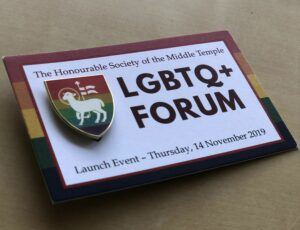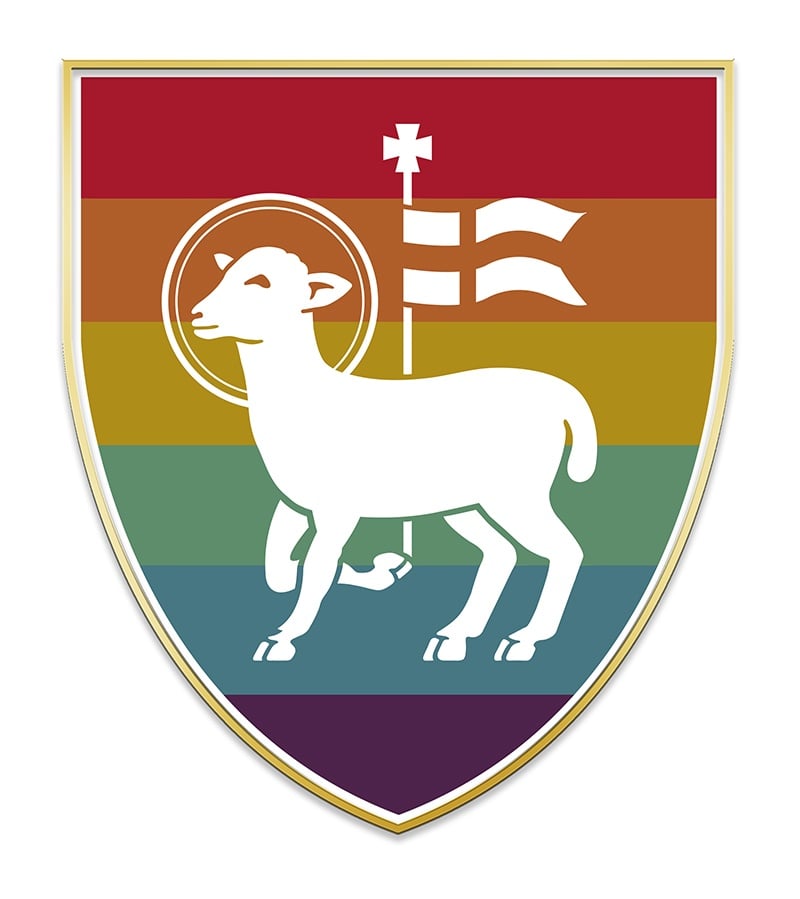
Do we need a Forum?
For an institution with some 700 years of history, establishing an LGBTQ+ group in 2019 might seem somewhat belated. Sadly, the need for LGBTQ+ members to be supported within the structure of the Inns came to the fore in 2017, following the report of Marc Mason and Dr Stephen Vaughan at University College London, entitled Sexuality at the Bar: An Empirical Exploration into the Experiences of LGBT+ Barristers in England & Wales. The authors conducted a survey of LGBTQ barristers, in which they found that just over half of those consulted reported having experienced discrimination in some form linked to their sexuality; one-third had suffered bullying or harassment.
Sadly, the Inns of Court came in for particular criticism ‘for not doing enough to signal their support for LGBT+ members of the Bar’. On a particularly depressing note, one bar course student described an occasion when a Bencher at a qualifying session was heard to say, ‘I don’t trust fags like you’. The Inn in question was not identified but it is a huge source of sadness to me, and – I will admit – anger, that any member of this Inn, particularly a student, might come away from any of our events feeling ashamed or attacked for who they are. Do we need this Forum? Absolutely.
The historical context
Unlike the first woman or the first BAME barrister admitted to the Bar, there will never be a record of the first gay man or woman, the first bisexual or the first trans person to be called by the Inn. Of course, that’s not to say their names are not contained in our archives: LGBTQ+ people have always existed and, arguably, just as London has always been a queer city (to quote Peter Ackroyd’s Queer City: Gay London from the Romans to the present day (Chatto & Windus, 2017)) so indeed have the hallowed grounds of the Temple. Since at least the century in which the Middle Temple was established, Fleet Street and Chancery Lane were known for their ‘suspect’ houses. Perhaps unwittingly, the Inn itself has played some part in LGBTQ+ history in ways that are now largely forgotten.
Gossip surrounded the Knights Templar, our namesake, from very early on. There were rumours abounding that it was a directive of the Knights of the Temple to copulate and bugger as part of their order and two attempts were made to bring to trial knights for allegations of sodomy. In reality, such rumours likely came – as rumours do today – from ignorant people associating small, marginal groups with perceived ‘sins’ but they do perhaps hint at a queerer history than one might suppose for the Temple. Later, when Twelfth Night was performed in Hall, the roles of Viola, Olivia, and Maria were almost certainly played by young men. In their effeminate roles, these men would later become associated with the French word ‘gai’ (cheerful), which overtime gave us the term ‘gay’ that we know and have embraced today.
Perhaps a more fun (if seedier) side of the Temple district’s history comes from the fact that it was – along with Lincoln’s Inn fields – a place to meet like-minded people in public facilities, popularly known in the eighteenth century as ‘bog houses’ or (more commercially) ‘the markets’. In 1701, for example, the London Post ran a story concerning a young man ‘sitting in Lincolns-Inn house of office’ when another young man ‘happened to go into the same box, whom the other welcomed, afterwards entered into a discourse with him, pretending great kindness for him etcetera. But at last discovered his intention, to commit the filthy sin of sodomy…’ Upon crying for help, the Inn’s porters and watchmen ran to his assistance and ‘cooled the spark’s courage, by ducking him in the said house of office, and afterwards left him to shift for himself’. Quite what the alleged victim thought would happen when he welcomed his would-be attacker ‘into the same box’ we can only guess.
While some gay men of the Inn presumably had fun of an evening, the Temple district was also an area in which some of the worst persecution of LGBTQ+ individuals was displayed for all to see. In 1810, the White Swan on Vere Street was raided by officers of the court, who were horrified to find an establishment containing beds, a ladies’ dressing area, and a ‘chapel’ for gay marriages to be celebrated. It was reported at the time that the chaplain who officiated had also recently enacted a birth, in which two men (dressed as midwives) used a pair of bellows to expel a Cheshire cheese as a new-born baby. Twenty-three men – including a butcher, a baker, a lord, and (one might imagine) a lawyer – were arrested. What does this have to do with us? Because just outside Temple, on Fleet Street, London’s newest pillory had just been erected.
After being found guilty at Bow Street Magistrates’, mobs gathered to watch the men being led to prison via the pillory. It took 200 policemen, 100 of them mounted, to protect them from the crowd. Words, mud, excrement, and projectiles were aimed at the men such that, by the time they reached Temple Bar, dirtied and bloodied, one contemporary observer noted that, ‘their whole persons appeared one heap of filth’. This would not be the first or last time that LGBTQ+ offenders were taken to the pillories just outside the Temple; for some, to be sent to the pillory at Temple Bar was akin to a death sentence.
A cheerful history? No. But just as my generation owes enormous gratitude to the generations immediately preceding ours, who led the Pride and civil rights movements that landscaped the more socially and legally liberal world in which we now live, there have been queer Middle Templars whose names are now lost to time but each of whom, in their own small way, contributed to the moment in which we now find ourselves.
What’s in a Forum?
Why a ‘Forum’? The urban myth I hoped to plant was that the Forum is named after the farcical Sondheim musical set in ancient Rome, A Funny Thing Happened on the Way to the Forum. Of course, that is untrue, but it is a great musical and, perhaps, that urban legend would not be so far from the truth. ‘Forum’ for our purposes is used in the context of its Latin origin, as an ‘open public space’. That usage of the word certainly encapsulates one of our objectives: to provide a safe and inclusive space for LGBTQ+ members of the Inn to meet, share ideas, to find support and inclusion, and (importantly) have fun. In the words of the late, great Frankie Howerd in his titular song for the 1971 film Up Pompeii, ‘There’s an awful lot that’s gone to pot, it’s getting out of hand; there’s no decorum in the Forum’.
Joking aside, the word ‘Forum’ has, of course, also become a byword in more common usage as a space for public expression. The need for the LGBTQ+ Forum to be a space for both expression and, importantly, a public one, is also crucial to our objectives and values. If the UCL report taught us one thing, it is that there is a real and pressing need for those of us who are established practitioners, wherever we feel able to do so, to make ourselves visible at all levels of the Inn: from the most senior bencher to the youngest student and most junior member of staff.
A personal note
Every single individual who identifies under the LGBTQ+ umbrella has their own unique story and set of experiences. At the launch event last November, for example, there were individuals who had ‘come out’ much later in life and who lived through those now inconceivable days when sexual acts between gays remained illegal. There were individuals whose families still don’t know of their partners or even that they identify as LGBTQ+. There were individuals for whom their one year on the Bar course in England was to be their one year to live freely before returning to their home countries, where acts of same-sex love remain illegal. None of those are my story and I am very fortunate in that regard.
Practically all my school years were spent under the cloud of section 28 of the Local Government Act 1988, which inserted Section 2A to the Local Government Act 1986 a prohibition on educational authorities promoting homosexuality in schools or publishing material with the intention of promoting homosexuality. The Act prohibited teachers from promoting same-sex relationships as (what the Act labelled) ‘a pretended family relationship’. That Act came into effect in 1988 and so was well ingrained by the time I commenced school in the early 1990s; it was not repealed in England until November 2003, by which time I was 17-years old.
In my 14 or so years of school life, I never heard a teacher refer to homosexuality, not even in the context of art or literature. There were no children who were openly gay in any of my three schools and my one reference point for what it meant to be a gay male in the 1990s was the children’s BBC drama slot at 17:00 on Tuesdays and Thursdays, where shows like Biker Grove or Grange Hill – though no doubt well-intentioned – depicted gay characters as people who suffered enormous difficulties in coming out and who, largely, were depressed or living in fear of HIV Aids. I saw politicians and popular singers ridiculed, their careers destroyed by tabloid trash for having the audacity to live a private life that involved gay sex. That was not a life I wished to live and I was, as a result, desperate not to be gay.
Fast forward and, in 2008, I became a Member of the Inn. Coincidentally, I joined the Inn in the same summer I accepted the reality that I am not a heterosexual or a bisexual man. As far as my relationship with Middle Temple was concerned, I cannot recall there ever being any LGBTQ+ reference point from the time I joined until the time I was called in July 2011 and moved to Manchester; I certainly cannot recall any overt homophobia but then, neither was I exposed to any positive messages of inclusion. Looking back, having come from an education system of radio silence under section 28, it was for me business as usual. And business as usual might be okay if a young member of the Bar already knows that being LGBTQ+ and being a barrister are not mutually exclusive. But I did not.
Upon being called to the Bar in 2011, I commenced pupillage that September and spent that year refusing to be drawn on questions about my private life. Throughout pupillage, the closet doors remained well and truly welded shut. In a new city meeting new people, it was a lonely experience. In fact, when I did come out (by taking my then-partner to a chambers event), the reaction of my colleagues was so overwhelmingly positive that I felt embarrassed not to have done so sooner.
I often look back at this period of my very early career and wonder how much of my perception of the Bar was shaped from what I actually knew or was just self-imposed belief. The reality, sadly, is probably a mixture. The one thing I do know is this: that had I met just one, openly gay barrister, Bencher, judge, or even staff member at the Inn during my year in London, I like to think that my experience of that time and my pupillage that followed would have been very different.
In 2019, I stood in the Prince’s Room in my Inn, at a launch event for the LGBTQ+ Forum with my partner, Jack, and surrounded by LGBTQ+ colleagues, friends and allies. In 2020, for the second year running the Inn is hosting an incredible event called Taking Pride, at which members of the Inn from across the LGBTQ+ umbrella reflect on their experiences at the Bar, the progress made and their hopes for the future. We are due to have not our first but second openly gay Master Treasurer, who will follow in the footsteps of the late and very much missed Master Jenkins. In short, we have come a long way.
Why is the Forum important? Because there is absolutely no excuse why now, today, any student should exist under the misimpression that to be LGBTQ+ in any way disqualifies them from succeeding in this profession, whether they are the youngest member of the Bar or aim to become the most senior justice of the Supreme Court. We would be lying if we were to tell them that they will not face any discrimination or hate, or that there are no colleagues who remain ignorant and on the wrong side of history. But the dinosaurs are facing extinction and their fossils will soon be confined to the dustbin of bigoted history. We cannot magic away the prejudices that many of our members may still face in everyday life, especially those students who will return to countries less liberal than our own. But we can make sure that their interaction with this Inn is one that is not simply neutral, but positively affirmative: success at the Bar comes from being who you are, not what anyone else thinks you ought to be.
What will the Forum do?
An important objective for the Forum is visibility. Identifying as LGBTQ+, for many of us, means that we are not immediately recognisable from our appearance as, say, women or BAME barristers might be. That is not a bad thing: many of us choose not to be defined simply by who we love or even our gender. I believe that visibility, however, for those that are comfortable with it and elect to be seen, will be critical to the role of the Forum. As Harvey Milk, the first openly gay man to be elected to public office in the US, said:
‘I cannot prevent anyone from getting angry, or mad, or frustrated. I can only hope that they’ll turn that anger and frustration and madness into something positive, so that two, three, four, five hundred will step forward, so the gay doctors will come out, the gay lawyers, the gay judges, gay bankers, gay architects I hope that every professional gay will say “enough”, come forward and tell everybody, wear a sign, let the world know. Maybe that will help.’

The Forum is a fledgling project. It needs to be supported and shaped by those who wish to get involved. It is hoped that members and staff of the Inn will continue to sign up, attend events or join the committee and help organise. There are many ideas and plans afoot, including talks and lectures, dinners, and the possibility to play a more pastoral or mentoring role; some of these ideas may have been ‘shelved’ during the lockdown but they have by no means been discarded.
In 2020, before the lockdown, we held a theatre trip to see The Lion King at the Lyceum; sadly, a garden party to celebrate the Pride March in London on Friday 26 June 2020 has, of course, been cancelled but in its place is the Taking Pride event, to be held via Zoom. In the future, when the new normal reverts back to normal-normal, we hope to attend Pride marches around the country, giving an important opportunity to those members on the Circuits to get involved.
It is very much our hope that the Forum will allow us to come together as a group of people who can support each other, mentor each other, socialise, love, and advise each other. No member of Middle Temple or its staff should feel that nobody is there for them. Our message is simple: you are not alone and the time to be an LGBTQ+ member of the Middle Temple family, whether practitioner, student or staff, has never been better.
